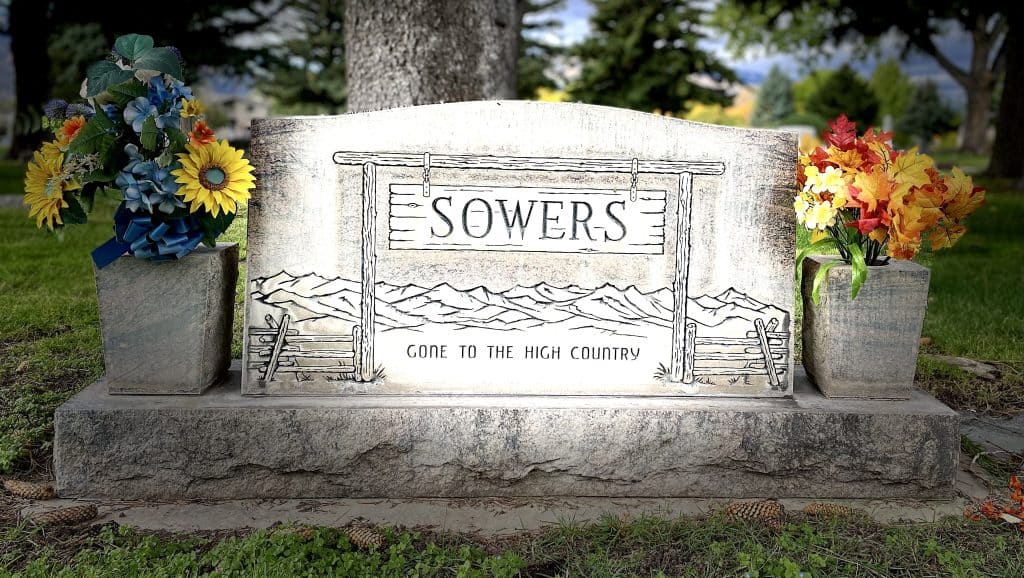
Do you need to arrange for a memorial grave marker, headstone, or monument and are unsure where to start? The information outlined below provides a simple, basic guide to assist you.
Understanding Cemetery Regulations
One of the most important things to consider in purchasing a grave marker is the cemetery regulations. Cemeteries regulate the headstones placed on graves within their grounds. Cemetery Rules and Regulations, as they are known, outline certain requirements such as size, material, and type of headstone.
Before you order a headstone for your loved one, you should check the cemetery’s requirements where your loved one will be interred. They can, and are known to, refuse any headstone that does not meet their requirements.
Check all their regulations carefully to make sure you know exactly what is and is not permitted before consulting a headstone supplier. Since headstones, grave markers, and monuments are often installed sometime after the funeral and burial to allow for any ground settlement, this does allow you to ensure you have time to consult with both the cemetery and your grave marker supplier to have your headstone prepared.
Note: Many reputable & established local masonry suppliers will be fully familiar with the requirements at their local cemeteries.

How soon can a Grave Marker be sited on a Grave?
For centuries, the custom of siting a grave marker has usually been the final detail in burying a loved one. For a family, it serves as a focal point when visiting the grave and can provide a sense of closure in immortalizing the memory of your loved one.
How do you know when to place a headstone marker on the grave? While no protocol has been set in stone (pun intended), here are some things to consider.
- Cemetery Requirements (as mentioned above, cemeteries will have strict rules on how soon a marker can be laid).
- Religious Customs – some cultures traditionally have an ‘unveiling’ of a grave marker. In Jewish tradition, this can be as long as one year after the deceased has been buried.
Different Types of Monument Suppliers
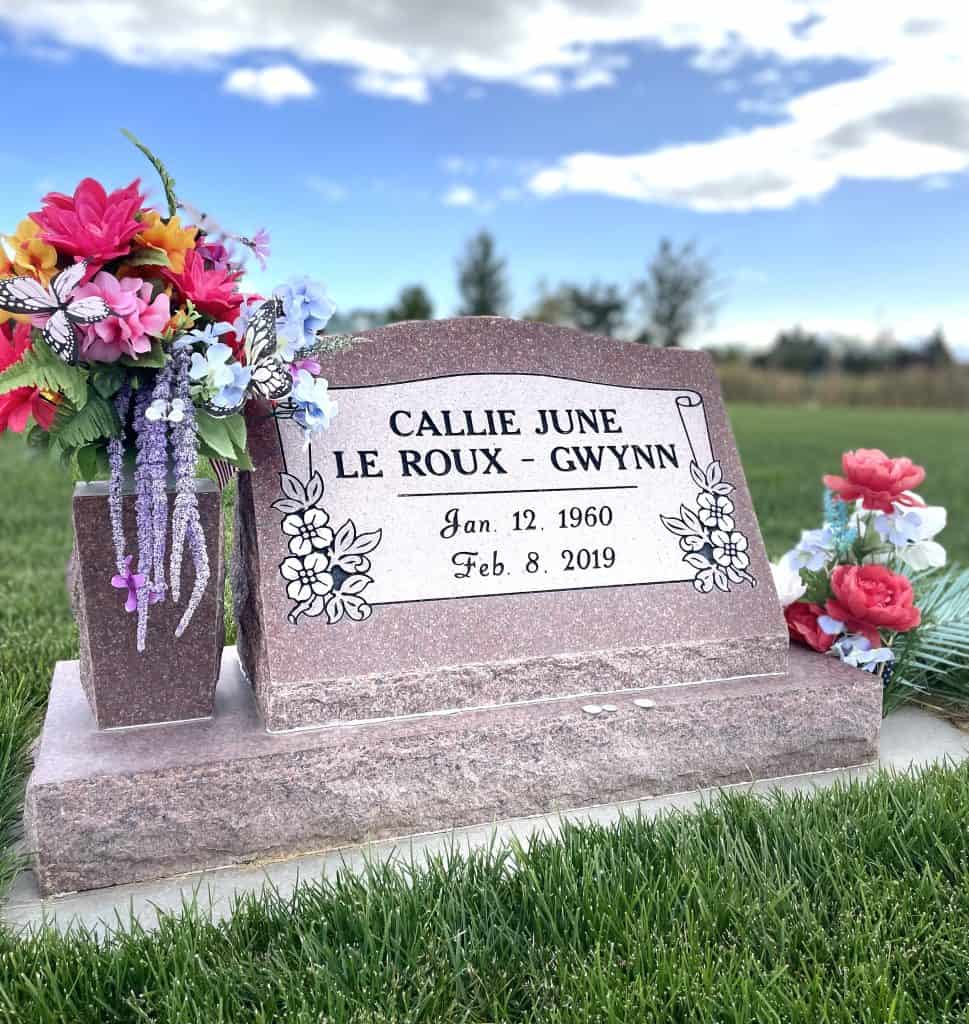
Headstones and Grave Markers can be purchased from a number of different monument suppliers. Historically, the funeral home or cemetery would sell you a headstone as part of your funeral package, and they would make all the necessary arrangements.
Alternatively, you could deal directly with local stonemasons to make your own arrangements. Many monument businesses are usually located close to cemeteries.
More recently, the Internet has revolutionized the monument business, and purchasing a headstone directly from an online supplier is now possible. In many cases, these suppliers are established by monument businesses.
A major trade-off of Internet-based monument suppliers is the lack of an actual showroom. However, this is often made up for by the lower prices they can offer. If the cost of a grave marker is a concern regarding your funeral expenses, then purchasing a grave marker from an online store can save you money.
In addition to offering significant discounts on the cemetery price of a monument, they can also offer 24/7 access, which means you can browse the selection of monuments at your own time and leisure.
Often, this allows the family to consult together during the period following a bereavement, especially when the family is separated by distance, and make decisions via an online grave marker supplier.
How do I choose a Headstone or Grave Marker?
Choosing a memorial headstone for a family member can be a difficult task. What type of memorial marker is appropriate? Once you know the cemetery regulations, this will help you to make your decision.
Many headstones are adorned with the name and dates of the deceased and some befitting symbolism. You may be called upon to make a decision about what is most appropriate for your loved one.
It may be that you choose something that reflects an important aspect of their life or interests – something they are remembered for. Or you may choose one of the many common symbolic themes such as angels, doves, candles, crosses, lilies, palms at prayer, etc.
Generally, these days, you can choose from granite, marble, and bronze as the material from which a headstone is manufactured. There are typically four main types of grave markers:
Monuments: that stand upright
Slants: which are more wedge-shaped
Markers: which are typically flat
Benches: which are designed to offer seating also.
Also, remember that you can choose either a single or companion grave marker. As many loved ones choose to be buried together, purchasing a companion headstone can often save money on a grave marker.
Some people can consider this a little macabre to have a companion headstone selected when one party still remains alive, but it is certainly a much more affordable option in the long run!
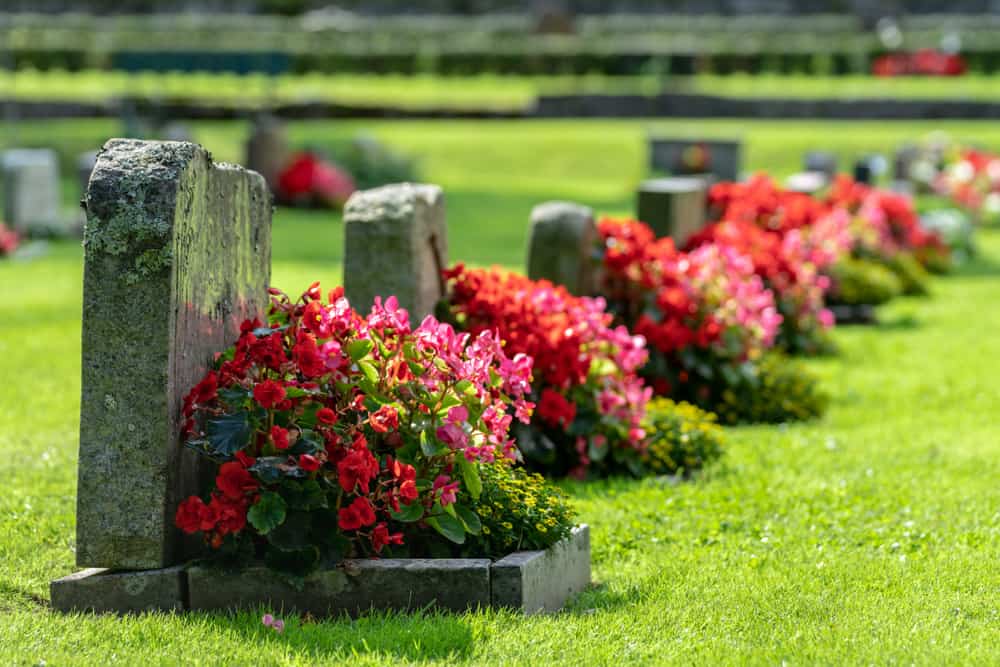
Selecting Headstone Epitaphs & Verses
Once you have decided upon the type of headstone, design, and symbolism, you will need to think carefully about what you wish to be carved or written as an epitaph on the grave marker.
It is common to have the full name and dates of birth and death. What else is added is down to a personal choice of the family and just how ‘personalized’ you wish the headstone to be.
It is wise to carefully plan this out, and your monument supplier will usually help you with this as part of their service. We have noted below some typical and amusing epitaphs.
Other accessories for grave markers
Adding a plaque or sculpture can enhance a grave marker or monument, and bronze decals have become more popular. In the case of veterans, bronze military decals are often an important part of the design of a grave marker.

The practice of adding images and photographs to grave markers has increased in the United States, particularly now that ceramic full-color photographs are possible. Many people also choose to add a vase to their grave marker so that there is a permanent feature for floral tributes.
Furthermore, lighting should be considered as an accessory feature for your grave marker. Candles have long symbolized remembrance in our culture, and with solar energy, it is now possible to permanently enhance a monument with solar crosses, angels, peace lights, and cemetery lights.
Grave markers and headstones in the 21st century
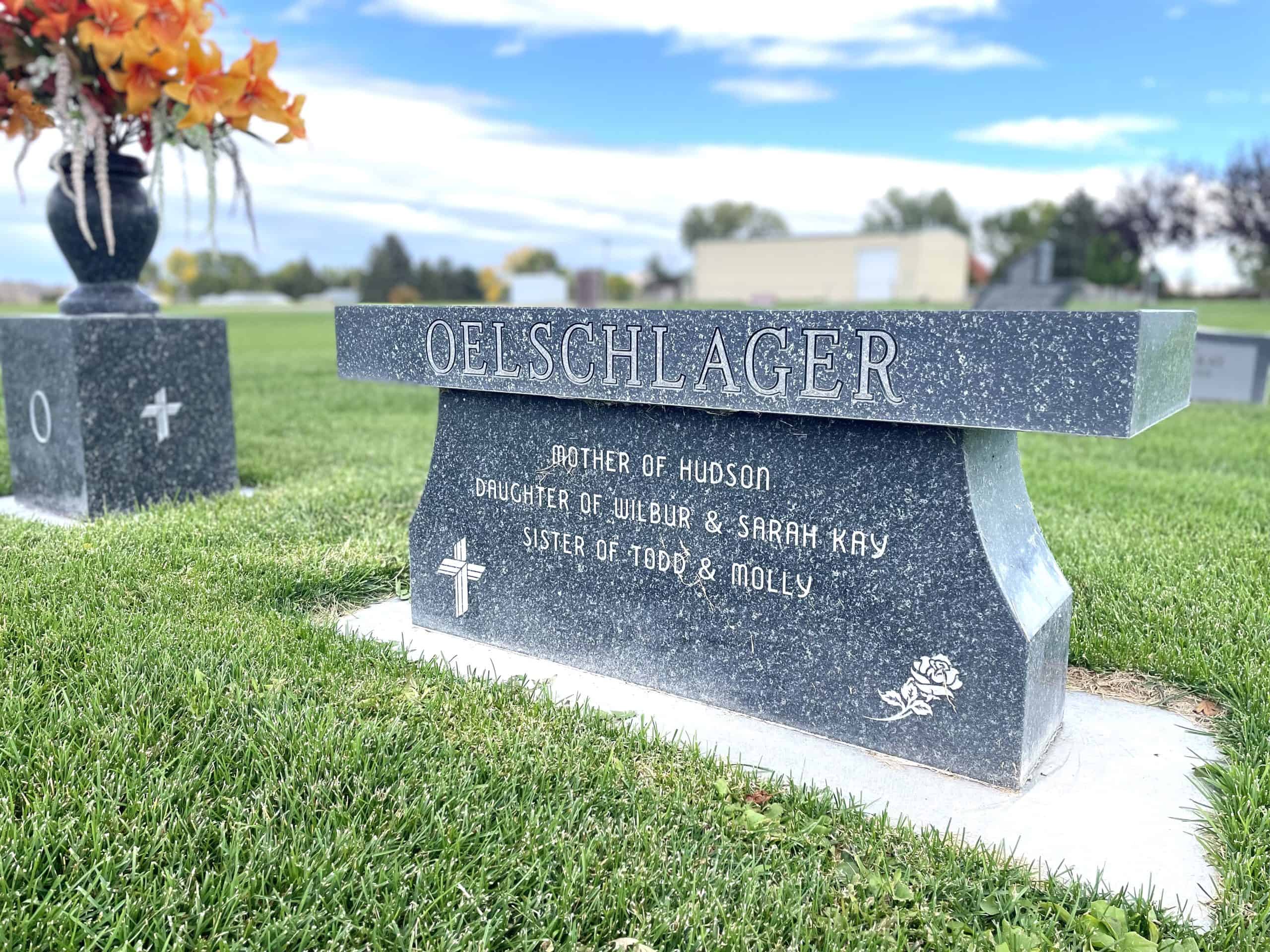
The technology and modernity of our society have moved into the monument industry as well these days, and if you so choose, you can now enhance a headstone with a number of ‘techie’ features such as:
- 3D Memorial Mask Grave Markers – with advanced technology, a three-dimensional, solid-life image portrait is created and mounted on your headstone. This non-invasive technique creates a ‘living’ 3D memorial image.
- Video-Enhanced Grave Marker (otherwise known as a VEGM or Vidstone) – as the moving image has so become a cornerstone of our culture and is often used as part of the memorial process, so it was inevitable that it would become a feature of a permanent memorial grave marker. The idea of a VEGM is that the grave marker has a weather-proofed solar-powered video and LCD monitor to facilitate playback and recording initiated by remote control. At present, the costs for this kind of technology do not make it cost-effective for most, with estimated costs starting anywhere around $1,000 for the technology alone.
- Interactive Headstones – still largely a new technology, but QR codes can now be placed on headstones, so cemetery visitors can use their smartphone to interact with chips implanted in grave markers in order to access a full obituary of the person interred on our handheld devices.
Can I Pre-order a Grave Marker and Headstone?

Yes, pre-need purchasing of a monument or grave marker has become more popular based on common sense and economic need. A memorial headstone is a significant means by which we create a lasting tribute to our life, and yet it can also be one of the major costs of end-of-life expenses.
As materials costs can keep rising, pre-purchasing a grave marker can conserve your estate now and save loved ones from the worry of such an expense at the time of need.
Many couples who desire to be buried together can pre-plan the selection of their burial plot and a grave marker. This enables loved ones to decide together what they want and takes that pressure from their children and family.
What is the typical cost of a headstone, grave marker, or monument?
As with all purchases, costs can vary significantly and largely depend on your specific requirements. What type of grave marker you select and what material, plaques, and accessories you choose all affect the overall cost, and it would be very difficult to quote an average price.
We wholeheartedly recommend that you compare prices and consult with more than one monument supplier to ensure that the price quoted is equitable.
Small flat granite grave markers can start from as little as $95.00, but at the same time, the cost of a granite monument can run into thousands of dollars.
Remember…..
As a grave marker will not normally be laid on a grave immediately, do not feel under pressure to rush the process of arranging a marker. It is, obviously, more important to ensure you end up with a time-preserved, elegant, and befitting memorial tribute for generations to come.

Cremation and the Memorial Marker Industry
We are undergoing a major revolution in the funeral industry at present. The rise in cremation is taking the industry by storm and seriously affecting its profits, as cremation presents a more affordable disposition option.
A reduction in burials has a knock-on effect on many other industries besides the funeral home business. Cemeteries and grave marker companies are faced with challenges as the demand for burial plots and headstones declines.
Many cemeteries are adapting by installing more columbarium space to accommodate interred cremated remains in cremation urns or simply adding a ‘scattering garden’ to their existing memorial grounds.
A full-size memorial marker is no longer required when a family chooses to inter a cremation urn in a columbarium or other memorial space. However, there is a growing market for memorial plaques, garden rocks, statues, benches, and other memorial paraphernalia that can be placed in tribute to a cremated loved one.
With more people opting for cremation and either scattering or the interment of a small cremation urn, the size and variety of grave markers are likely to completely change. This also presents a greater scope for families to purchase memorial markers online.
A small plaque or memorial rock may not require installation like a full-size headstone does, enabling families to buy online and arrange the siting of their marker themselves.
Read our Guide to Creating Your Own Memorial Tributes to learn more about How to Create Your Own Bespoke Memorial Markers.
Mobile headstone engraving or on-site engraving
On-site engraving, or on-site inscription, is where a monument dealer will visit the cemetery and conduct any inscriptions to a memorial marker without needing to remove the headstone.
This can be a cost-saving way to either add an inscription to a grave marker or even amend an existing epitaph.
Unfortunately, many cemeteries are not too pleased that families can now opt to purchase a grave marker elsewhere and are therefore not always very cooperative when it comes to making amendments or changes to a grave marker that they did not sell in the first place.
If you require changes to the inscription on a headstone, it is probably advisable to consult a local monument company within 50 miles of the cemetery and find out if they can conduct on-site engraving.
Although the cost of on-site engraving can vary between companies, in our experience, it is usually around $125 – $150.
Can I insure my memorial grave marker against damage?
Families have asked this question a number of times. Some families spend thousands of dollars on a headstone and want to ensure it is somehow covered against any damage, be it accidental or vandalism.
The good news is that, yes, you can insure your grave marker. Many home insurance policies now include accidental damage coverage for a memorial marker up to $5,000.
In 2000 the Insurance Service Organization recommended that insurance companies should offer this coverage.
However, not all do, so you should check this with your homeowner’s insurance company. A cemetery’s own ground maintenance more often damages a grave marker than any malicious activity.
If you notice damage to a grave marker, you can first check with the cemetery and its perpetual care coverage. All cemeteries build in ‘perpetual care’ into their cemetery costs, enabling them to maintain their grounds.
If your marker appears to be damaged due to a deterioration of materials, then you can contact your grave marker supplier. Most suppliers offer a lifetime guarantee against wear and tear caused by the elements and will arrange to repair or replace your headstone if it has rusted, faded, or cracked due to nature’s elements.
Knowing that your homeowner’s policy can cover your family memorial markers can give some peace of mind about the costs of replacing an elaborate or heritage marker.
What size does a grave marker need to be?
The standard size for a grave marker typically depends upon the grave plot. There are general standard sizes for single, double, or infant plots.
A standard size for a single grave is 24” by 12”, although 28” by 16” is used for more elaborate single headstones or double-depth graves where 2 names need to be inscribed on one headstone.
The typical dimensions for a companion grave marker that sits centered over 2 side-by-side graves are 36” by 18” or 44” by 14”.
A headstone for an infant grave plot or a cremation urn interment plot is generally standardized at 16” by 8”.
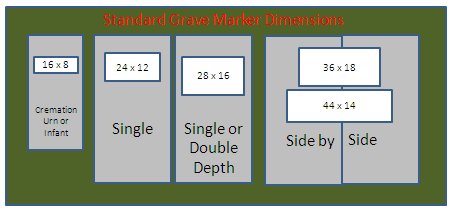
These sizes are just general standard dimensions, but you should check with your cemetery about its regulations regarding memorial markers before purchasing a grave marker.
Can a name be printed on a gravestone before burial?
Yes, I believe so. Some people even choose to have a partner headstone done (for husband and wife) and have both names printed on it when it is installed for the first death. They just leave the dates off and add these later!
What is the standard depth of an engraved headstone?
“While I can’t speak for every company, I can tell you how we inscribe. For years, we maintained a number of government contracts inscribing markers for our US Veterans in 13 of our National Cemeteries.
Strict regulations needed to be met. One, in particular, was an inscription depth of approximately 1/4″. We continued using this standard depth on the markers that we sold to the public.
There are times that an area of very detailed artwork may need to be inscribed slightly shallower to prevent the risk of damaging small, raised pieces of granite, but anything else should be very near 1/4″. Hunter Collins [Affordable Markers]
When a bronze memorial is bought in advance, is it inscribed at that time or at the time of death?
You can choose either. You can have it inscribed at the time of purchase or choose to have it inscribed at the time of installation.
The Headstone, Tombstone, and Grave Marker Industry today in the U.S
Placing a permanent, time-withstanding memorial marker at the site of a tomb or grave has a long tradition. It is believed Tombstones originate from a long-held Jewish custom whereby visitors to a tomb or grave place stones at the head of the grave.
Headstones were originally based on an ancient tradition related to death. It was a commonly held belief that in order for the dead to remain in the grave, large piles of rocks (or cairns) must be placed above the grave.
Today, the terms Headstone, Grave Marker, and Tombstone are largely taken in common language to mean a permanent memorial marker at the site of a burial. However, it was not always so, and a tombstone or headstone was traditionally the stone lid for a coffin.
Whereas the ‘gravestone’ or Grave Marker was the stone set upon the gravesite as a visible ‘marker.’ Gravestones were originally made from marble, sandstone, and even wood at different times. However, these materials often proved unable to withstand the tests of time.
A tombstone today is usually constructed in an entirely different style than previous generations, and grave markers are now quite elaborate and ornate. Tombstones of yesteryear were typically up-right pieces of sculpted stone that had engraved information about the people whose graves they marked.
Yet most of today’s tombstones are smaller, simpler, plaque-like pieces made of bronze, granite, or a combination of the two, displayed directly on the ground at the head of graves. Large up-right tombstones are less common these days, as time has shown that they tend to deteriorate and fall over as years pass. Tombstones installed at ground level are designed to weather the elements much longer.
Although the style and design of Grave Markers have changed over the years, they still remain a central memorial custom. Today’s Headstones and Grave Markers are generally made from granite and bronze. A bronze plaque, or plate, is typically decorated with a memorial design and the deceased’s name and dates.
This plate is then inlaid to a granite marker and placed at the gravesite in the cemetery. The costs and legislation relating to Grave Markers and Headstones have also impacted how design and style have changed over the years.
Nowadays, cemeteries have strict rules governing what markers can be placed, and all markers need to be installed by a qualified masonry professional. Many cemeteries have guidelines for grave marker sizes and can refuse to allow a headstone memorial to be sited if it does not conform to these guidelines.
Traditionally, a grave marker or headstone would be ordered directly through the funeral home, cemetery, or a local stonemason. In modern culture, purchasing a grave marker independently and arranging to have it sited is possible. Many established stone masonry and memorial companies offer this service, and you can even order a headstone online these days, often at a significant discount.
————————————-
Over the centuries, grave markers and headstones have greatly changed – for the better. Early grave markers were stones and boulders placed on graves for a strange and superstitious purpose. It was believed they were needed to keep the dead from rising from their graves. The weight of the markers was meant to keep them from climbing out from beneath the heavy rocks.
Eventually, grave markers were instead used to memorialize the person buried there. Early grave markers were made from rough stone or wood and did not last long over time due to exposure to wind, rain, and snow.
In Europe and in old New England, carvings on headstones were used to frighten the living to maintain a life of righteousness with images of horrible damnation. Carvings on these monuments were usually skeletons, angels of death, and winged skulls.
However, changes for the better began in the Victorian era. Headstones and grave markers in American cemeteries were now ornamental. Companies formed specifically for this purpose made beautifully carved statues and mausoleums. Italian immigrants who had studied carving in Milan were hired to do the intricate carving that had become so popular.
Carvings on headstones were now used to make a statement about the lives of the deceased. Images such as flowers, especially roses and lilies, represented purity and love. The willow tree, urns, and columns are just a few examples of the changes in funeral art. Cemeteries had become places that appeared park-like and tranquil instead of creating fear in the mourners.
There are several different names for grave markers: cemetery headstones, grave headstones, memorial headstones, granite headstones, bronze markers, affordable headstones, discount headstones, and upright headstones, to name but a few.
A number of headstones and grave markers were inscribed with amusing or thought-provoking epitaphs. The following can be found at Benjamin Franklin’s gravesite:
“The body of B. Franklin, Printer
Like the Cover of an old Book
Its Contents turn out
And Stript of its Lettering and Guilding
Lies here, Food for Worms
For, it will as he believed appear once more
In a new and more elegant Edition
corrected and improved
By the Author.”
Some amusing epitaphs:
In a New Mexico cemetery – “Here lies Johnny Yeast, pardon me for not rising”.
In a cemetery in Nova Scotia – “Here lies Ezekial Aikle, Age 102, The Good Die Young.”
A man who died in an accident – buried in a Pennsylvania cemetery – “Here lies the body of Jonathan Blake, Stepped on the gas instead of the brake.”
In Silver City, Nevada – “Here lies Butch, We planted him raw, He was quick on the trigger, But slow on the draw.”
A lawyer in England – “Sir John Strange, Here lies an honest lawyer, And that is Strange.”
In Boot Hill Cemetery in Tombstone, Arizona – “Here lies Lester Moore, Four slugs from a .44, No Les No More.”
In a Georgia cemetery – “I told you I was sick.”
Some epitaphs of celebrities:
“That’s All Folks, The Man of 1,000 Voices, Mel Blanc”
(He did the voices of Bugs Bunny, Porky Pig, Elmer Fudd, Daffy Duck and countless other Disney cartoon characters).
“She Did It The Hard Way – Bette Davis”
“My Jesus Mercy, Alphonse Capone”
(The notorious gangster Al Capone)
“A Star on Earth – A Star in Heaven, Karen Carpenter”
(Singer who died in her 30’s of anorexia)
“A Gentle Man and a Gentleman, Jack Dempsey”
(Heavyweight boxing champion)
“Called Back, Emily Dickinson”
(Well-known poet)
And strangely, this is all that appears on the headstone of famous funnyman W.C. Fields “1880-1946″.
Related Articles:
Resources:

